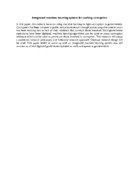| dc.contributor.author | Barasa, Peter Wawire | |
| dc.contributor.author | Wechuli, Alice Nambiro | |
| dc.contributor.author | Barasa, Samuel Wafula | |
| dc.date.accessioned | 2019-04-03T06:35:01Z | |
| dc.date.available | 2019-04-03T06:35:01Z | |
| dc.date.issued | 2018-06-12 | |
| dc.identifier.isbn | 978-9966-59-011-5 | |
| dc.identifier.uri | http://erepository.kibu.ac.ke/handle/123456789/586 | |
| dc.description.abstract | In this paper, the authors focus on using machine learning to fight corruption in governments. Corruption has been rampant in public and private sectors though prosecuting the cases in court has been wanting due to lack of clear evidence that convicts those involved. Since government operations have been digitized, machine learning algorithms can be used to scout corruption evidence which can be used to prosecute those involved in corruption. The research will adopt a positivism research philosophy and Inductive research approach. Desktop research design will be used. This paper seeks to come up with an integrated machine learning system that will connect to all the digitized government systems to curb corruption in governments. | en_US |
| dc.language.iso | en | en_US |
| dc.publisher | KIBU | en_US |
| dc.rights | Attribution-NonCommercial-ShareAlike 3.0 United States | * |
| dc.rights.uri | http://creativecommons.org/licenses/by-nc-sa/3.0/us/ | * |
| dc.subject | Machine Learning | en_US |
| dc.subject | Corruption | en_US |
| dc.subject | Machine Learning Algorithms | en_US |
| dc.subject | Integrated System | en_US |
| dc.title | Integrated machine learning system for curbing corruption | en_US |
| dc.type | Working Paper | en_US |

